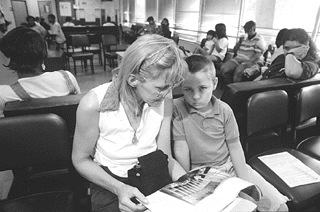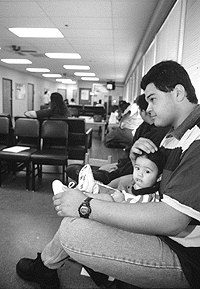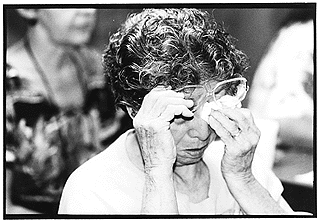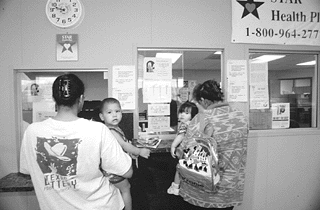https://www.austinchronicle.com/news/1997-06-13/529090/
Get Out the Bootstraps
Cause Texas Ain't Takin' Care of You No More
By Audrey Duff, June 13, 1997, News
|
|
Kathy and her partner Frank are new at the welfare game. Public assistance was something they thought they would never need. But that all changed three weeks ago when the couple was laid off from their jobs at a local restaurant where Frank worked as a bartender and Kathy waited tables. The restaurant, they were told, had failed. "Before they fired us they closed the restaurant for a day and said they were treating the place for insects," Frank recalls. "Turns out they were exterminating us."
Kathy and Frank say they looked to relatives for help, but that their families had troubles of their own. The day after the couple were fired, they moved to a new apartment, and, with no money coming in, they could not afford to hook up a phone. That made it especially difficult for potential employers to get in touch with them about jobs for which they had applied, and since they did not own a vehicle, getting around town to even look for prospects was a major undertaking. Out of work, money, food, and ideas, Frank and Kathy decided to turn to the Texas Department of Human Services (DHS) for help. It wasn't something they wanted to do, they say. "It's the stigma. It's embarrassing," Kathy says. "We've paid our taxes all our lives. We've never abused anything like this."
"It's only temporary," Franks quickly adds. "It's not like they give you enough to get anywhere. It's survival."
And that's just the kind of attitude that make Frank and Kathy the perfect clients under the new welfare system brought on by recent reforms. On August 22, 1996, when President Bill Clinton signed the Federal Welfare Reform Act, the plan was to "end welfare as we know it." Before those reforms, Frank and Kathy could have sat at home and collected food stamps "forever," according to Rosemary Patterson, public information officer for the DHS. But Clinton's plan, which went into effect last fall, dictates that if Frank and Kathy fail to find jobs, they will be cut off in six months. If they had not been laid off, they would have been pushed out of the nutritional assistance nest in just three months. The key word here is "temporary," and Kathy and Frank say that suits them just fine. "We only wanted a month of food stamps anyway, but (the case worker) said we would get three months. No wonder people do this for a living," cracks Kathy.
Despite the joke, that attitude - that most people on welfare are somehow undeserving scammers living needlessly off the rest of the tax-paying public, is prevalent among working Texans. "The middle class families are out there struggling to make ends meet and to make a good life for their kids. And there's this perception that there's a whole group of people who don't do anything," says Patterson. "They see somebody in line at the grocery store buying something with food stamps and they think people are living off of food stamps. There's a lot of misunderstanding about who these people are."
Little surprise, then, that after 60 years of bolstering the incomes of our nation's poor, the backlash has hit home in a state where bootstrap-pulling is a point of honor. But while conservatives hail reforms as a way to help lazy welfare recipients overcome their unhealthy dependencies on a too-generous government, many liberals decry the welfare overhaul as nothing less than a crisis that will drown the poor who are barely keeping their heads above water as it is. Under the reforms, the feds have, for the first time, given the states the power and responsibility of designing their own plans to dispense a limited amount of funds. Just how will Texas' reforms affect a poor population that Patterson says is "panicked?" And who are some of the folks who "take advantage" of the programs that the government has to offer? The Chronicle spent the day in the welfare office in South Austin with DHS clients such as Frank and Kathy to find out.
Bush's Private Dreams
|
|
The wasted day was an eternity to Hutchinson's grandchildren, as well as to those who took time off work or had fussy babies to entertain. (Not to mention the fact that there are no vending machines in the DHS waiting room.) Hutchinson's grandkids, whose father is deceased and whose mother does not receive health care benefits at her temp job, say the long wait just added to the feeling that they, and others who rely on the government for assistance, are worthless. "The feeling you get is that you are poor, lazy, and stupid," says 13-year-old Susan.
"Everything except `good,'" adds her brother Nathan, 10. While the kids' mother makes "too much" money at her job to receive food stamps or Medicaid for herself, the children are provided with free health care by the feds. A program that Hutchinson says is a lifesaver, regardless of the glitches.
The oft-criticized switch to group appointments, according to one case worker, was a recent DHS office reform to increase efficiency by using fewer staff members to serve more clients. The agency was under the gun throughout the 75th legislative session, as Gov. George W. Bush and the Lege pushed to allow private companies to take over the dole-divvying responsibilities of state government. The idea became feasible in the wake of the welfare reform bill's passage because it replaced the old system of federal funding for aid programs with block grants for the states. Texas now has the latitude to design its own programs to dispense with its $486.3 million grant from the federal government, and with potential penalties looming for states that do not move an acceptable number of aid recipients from welfare to work in the next few years, lawmakers are looking to the private sector to run a tighter bureaucratic ship. With the eyes of the nation upon Texas, Bush and the Lege met with federal resistance, however, and just last month federal officials formally rejected Texas' privatization plans, which would have allowed companies to run a one-stop public assistance program covering everything from food stamps and Medicaid to benefits for needy families.
To the relief of welfare privatization critics, the White House administration determined that it is illegal to allow private industry to decide who is eligible for welfare benefits. Advocates for the poor worried that bottom-line minded private contractors would hack away at the public aid awarded to needy families faster than you could say "for-profit." Employees' unions were none too happy about the prospect of losing thousands of public sector jobs, and some opponents to privatization pointed out that defense contractors such as Lockheed Martin and Electronic Data Systems - which were lined up as bidders drooling over Texas' billion-dollar welfare industry - hardly seem cut out for the public assistance business. The White House decision to deny Texas' request for a federal waiver of the law requiring public workers to determine food stamp eligibility reportedly left Gov. Bush fuming. However, the feds did leave open the option of private contractors running other operations currently being managed by DHS. And while Gov. Bush said he would find other ways to save taxpayer money and get welfare recipients to work, the fight continues to make Texas the first state to privatize its system.
Targeting the Homeless
A television affixed in the upper corner of the far end of the welfare office waiting room blares inane daytime talk shows and a single mother, Janice Edge, sits watching with her daughter's head in her lap. The girl, 11, is obviously in pain, and Edge explains that they have come requesting Medicaid money to extract a throbbing tooth. "I was going to pull it myself, but the dentist told me not to," sighs the woman. Edge says that she is between jobs, temping off and on, but that kind of work doesn't provide health benefits. She abruptly gets up to go to the bathroom to attend to a nasty cough of her own. Next to the ladies' room, a sign on the bulletin board in the South Austin welfare office reads: "On the road to success... welfare is a temporary stop, not a permanent destination. Get into gear... start a career." Simple words, but in that message lies the crux of the federal welfare revolution.
|
|
Bitner had managed to hold on to the food stamps immediately following the federal changes that became effective in October by taking a
20-hour job training course for one week out of a month, and by volunteering 20 hours a week to do community service. But when that ended, the clock started ticking. What had not sunk in for Bitner was that unless a recipient volunteers, trains, or works for at least 20 hours a week, it only takes three (nonconsecutive) months on food stamps in a 36-month period to become ineligible. Bitner was out on his ear in March.
To Jim Mundt, a caseworker at the Eberhart Road DHS office - who makes it clear that his views are his own, not necessarily those of DHS - the food stamp revisions were "a pretty major reform.... Reforms tend to come in little driblets, but that one was like wham," Mundt says. "That pretty much targets all the guys who are homeless - they'll have to find another way to survive."
Much of the homeless population is unemployable due to mental illness and addiction problems, but DHS's Patterson points out that society has lost patience with the perennially under-employed homeless. "There's a lot of fraud in (the homeless) population," Patterson says. "We just did a big raid in Houston with... food stamp trafficking. The homeless population sold the food stamps to buy wine."
In 1996, 170,000 Texans dropped off the food stamp program - the largest statewide decline in 30 years. A boom ecomony and low unemployment rates had a lot to do with the decrease, but state officials concede that not everyone found jobs - stricter eligibility requirements played a big factor. The Texas food stamp rolls are expected to shrink again to reflect the federal reforms that forced out DHS clients such as Bitner in March. "Clients are angry," Patterson says. "We've had an awful lot of reports of (clients) making threats against caseworkers."
Bitner himself is in good spirits today, confident that his food assistance will be reinstated. This time he brought a letter from his doctor proving that he had suffered debilitating head injuries in prison from a beating by his fellow inmates in 1992 that to this day causes severe seizures. (Bitner served time for cocaine possession.) "Unless you are disabled, or have children, you can't keep getting food stamps," Bitner says. "(The government is) big on going to work." Bitner says he made a good living as a professional carpet-layer in the Seventies, but that with his injuries, no one will hire him now. "I love to work," Bitner says. "I used to make a grand a week sometimes. Sometimes two thousand (dollars)."
Unbeknownst to many "inconvenienced" customers in the grocery store line, plenty of food stamp recipients do work for a living and they aren't single parents - they just need extra help. Richard Rowland waits with his wife and his
9-month-old son in the welfare office to see if they are eligible for food stamps. They already have their child on Medicaid to make up for the fact that Rowland's full-time position as a security guard doesn't provide health insurance. But, for the first time, Rowland says he needs nutritional assistance as well. "We tried every possibility not to (apply for food stamps)," Rowland says. "But I'm putting my wife through school."
Can't TCB with AFDC
|
|
The "hybrid" Texas AFDC program, like the federal reforms, puts 1 to 3 year time limits based on educational levels and recent work histories on cash assistance to clients. For example, a caretaker who has completed less than 3 years of high school and hasn't worked in 6 months can receive 36 months of cash assistance, while a caretaker who has a diploma is eligible for only 12 months. The kicker is, under Texas' rules, once a caretaker has exhausted the time-limited benefits, he or she is not eligible for assistance for another five years. So how do the HB 1863 reforms differ from the federal ones? "The one highlight about 1863 was that it said when you don't get a job and follow the time limits, you will lose your benefits, but your children won't lose their benefits," Patterson says. "The federal welfare reform law doesn't say that."
That's all well and good, but the fact is, Texas will eventually have to face the federal reforms when the state's six-year waiver runs out in 2002. That date could become D-Day for many poor Texans and their children. Under the federal reforms, AFDC recipients get a total of five years of assistance - that means they will never receive another penny of help to raise their kids. Ever. To make matters worse, DHS believes that the length of time that Texas recipients receive benefits under our state's current waiver will, at the end of the six-year waiver period, count toward a recipient's five-years-in-a-lifetime federal time-limits. Further, the time that children in Texas collect AFDC payments could count against the federal limits for their caretakers, according to DHS.
By 2002, according to a September 15 article in the Houston Chronicle, to hold on to AFDC assistance, half of Texas' welfare mothers must work, go to school, or participate in job training programs. Are there enough spots to accomodate them? Not even close. Public Policy Priorities Center analyst Diane Stewart, of Austin, said in the Houston Chronicle, "There's nobody in this state who believes we can meet those targets."
Opponents to the time-limit plan predict that hundreds of thousands of children across the nation will be thrown headlong into poverty. This is why three high-ranking government officials in the U.S. Department of Health and Human Services resigned when Clinton signed the welfare reform bill. This is why, according to Time magazine, the President himself, before signing the bill, called it a "decent welfare bill wrapped in a sack of shit." This is why the poor are quaking in their bootstraps. And if they aren't worried, they should be.
The trick, Patterson says, is to convince those who may be affected that there is imminent danger. They must become employable, and employed, now. Another motive the DHS has for convincing clients to smell the coffee is that the change of AFDC from an entitlement to a block grant to the states now puts the burden on Texas to get welfare recipients to work, or the state will suffer the loss of federal funds, further worsening the problem. With the welfare-to-work mantra in mind, to receive AFDC in Texas, lawmakers made it mandatory that clients sign a "personal responsibility agreement" that, in addition to promises not to use or sell drugs, and to take the children to the doctor, includes a pledge to participate in the JOBS (Job Opportunities and Business Skills) program administered by the Texas Workforce Commission. In fact, that promise is number one on the list. Patterson explains that the new emphasis is on getting a job, pronto. "The old philosophy was that if you are eligible for this program, if you are poor, the government will provide a very minimal support for you.... The rank and file wouldn't lose their benefits if they didn't go to work. Now they will," she says. "So the new attitude with welfare reform is that work is what we all must do."
But what if there is no work to be had? One population bound to suffer when 2002 rolls around are Texas residents who live in counties with high unemployment. Counties in the Rio Grande Valley, for example, are particularly vulnerable - the job situation is so miserable there that AFDC clients will never be called to report to the JOBS program where they can receive counseling and training. The universal yanking of cash assistance in 2002 will come as a rude awakening to those currently receiving benefits in those counties. Another major group that may be lulled into a false sense of security under Texas' current reforms are caretakers with children under five. The Texas law currently provides aid to caretakers with children that age. But in 2002 federal rules will dictate that only children under one are guaranteed assistance. "We're trying to warn clients about these impending deadlines without scaring them to death," Patterson says. "It's just that most people don't think more than the next day. They are sure that they will be in a different situation in five years."
While welfare mothers who would rather live on the dole than work make for good soundbites, most women know that public assistance isn't enough to make it. Anyone who ever thought welfare benefits led to a cushy life is kidding themselves. Take it from Dianne Marra, 22, a single mother of a three-year-old daughter. Marra has joined Frank and Kathy and the other welfare applicants in the South Austin DHS office today to apply for a state-sponsored child care program. Marra, who says she receives scant help from the father of her baby, lives with her mother and works full-time, the 4am to 1pm shift, as a stocker at Wal-Mart. Although she could be eligible for AFDC if she wasn't working, the pay is not attractive enough to quit her Wal-Mart grind. "I couldn't survive on AFDC - they only pay $163 a month, and I would only be eligible for 6 months," Marra notes. Although she is applying for a much coveted child care program, Marra admits she probably won't qualify. "You have to be on AFDC or food stamps to get in, and you can't be working," she says. "People quit their jobs to get on that program."
No wonder. In a country where daycare costs can take half of a worker's paycheck, the question "What's the point of working?" has deep resonance. DHS's Patterson notes that paying a woman $183 a month through AFDC to take care of two kids is a steal when compared to private daycare prices. Perhaps annoyed taxpayers should look at welfare moms as cheap daycare workers. "It's the cheapest daycare you can buy," Patterson says.
Just Do It
But the work of raising children isn't good enough under welfare reform. Mothers of school-age children must work or undergo job training under Texas rules, and the welfare office is so concerned with getting this concept through the heads of its clients that this summer, the offices will forever change the way they look. "Right now the offices look like you're coming into a welfare office, sitting there waiting in line for your benefits, and you're going to leave," Patterson explains. Eventually, the offices will be called "work centers." There was even talk of referring to clients as "job seekers," but it was determined that that was a bit much. The "work centers" will be staffed with volunteers who will pull together job bank information on the computer, post want ads, and circulate brochures on how to write a resumé. "We will tell people to look for work, get a job, and highlight that this is temporary, that we will help, but this is what you need to be doing."
Despite all the jobs talk, advocates for the poor wonder what kind of work the welfare reforms will produce for this class of people. "There's not so much a focus on getting education as it used to be, but getting them back into the workplace as soon as possible," confirms caseworker Mundt. The fact that a welfare recipient may be heading to a life of dead-end jobs is no longer a concern. The government's stance is that work in itself will bring the self-confidence and sense of well-being to help that person strive for something better on his or her own.
Another change at the welfare office, according to Mundt, is that caseworkers are being asked to "pressure" clients to get jobs. "Before the reforms, we didn't focus on when are you going to get a job and how are you going to work? It was `What happened?,' he says. And if a complaint was lodged against a caseworker for making a client feel bad for not looking for a job, DHS would always back the client. Not anymore. "If somebody complains about being badgered, (our supervisors) say they will support us," Mundt says. "If a complaint came down before, they never supported us."
Alien Nation
|
|
Already, an estimated 141,000 legal immigrants will be cut from food stamps unless they become naturalized. But what the group at El Buen Samaritano was concerned about is that under the new federal rules due to go into effect in August, 38,450 disabled and elderly immigrants who cannot prove that they have worked 40 qualifying quarters in the U.S. will lose Supplemental Social Security (SSI) benefits which average about $425 a month. Commissioner Callahan admitted that the president disliked that portion of the bill when he signed it, and that he was still working to try and soften the measures without gutting the bill. (For more on how welfare reform will affect immigrants in Texas, see next week's issue.)
Panama native Marguerita Rodriguez, 73, wiped away tears as she spoke in Spanish at the gathering. Without citizenship and no qualifying quarters of employment to prove that she paid into the system, Rodriguez is destined to be cut off from SSI. "I haven't really worked, but I have raised my grandchildren," she said. "What I have done with my grandchildren is a contribution to the community, so why am I considered a burden?"
Rev. Case said that the reforms will also penalize legal immigrants who have worked and paid taxes, but who don't reach the 40-quarter requirement. "What welfare reform has done is it has created a very unfair and immoral situation by creating a class of noncitizens who pay taxes but who cannot receive services," said Rev. Case. "People are in despair, leading some to commit outrageous suicide attempts and deaths."
In addition to the SSI cutbacks, Medicaid will soon be a thing of the past for many legal aliens. DHS's Patterson says that the states had the option to provide or deny Medicaid to legal immigrants. "Texas decided to provide for the current recipients who are legal immigrants," she says. "However, those entering the country after August 22, 1996, are barred for five years or until citizenship, which is the same as with the food stamp program."
DHS caseworker Mundt observes: "It's in the spirit of the whole Texas attitude - if you are not a part of our nation, then our nation shouldn't be supporting you."
For a Rainy Day
So with the Food Stamp program, AFDC, Medicaid, and SSI, the reforms have been swift, and some say, terrible. In light of how much the poor cost the nation, the reforms do seem a bit out of whack. According to a January 8 story in the Washington Post, welfare programs cost just 1% of the federal budget and 2% of state budgets. And, according to a nonpartisan report published last September by the Population Reference Bureau, the poor are increasing in both numbers and in desperation, "not because they refuse to work but because their wages are plunging and society offers them scant support," wrote The Dallas Morning News' George Rodrigue.
Another common misperception - promoted by U.S. Sen. Phil Gramm when he argued for welfare reform - is that poverty is somehow caused by the government's generosity. However, the Washington Post story notes that, "for all these [government] programs' supposed ability to create dependency, more than half of welfare recipients stay on the dole less than two years, moving off to build productive, taxpaying lives."
That certainly seems to be in the cards for Frank and Kathy. Back at the South Austin welfare office, as the day is winding up and the office waiting room emptying out, the out-of-work couple are pleased with the outcome of their visit. They received $278 in emergency food stamps to carry them through June. Because they were laid off, both expect to receive unemployment benefits as well. With the pressure off, and some breathing room available to hunt for jobs, Frank and Kathy are less harried than when they first arrived. "Can we go home now?" asks Frank in a mock whine. Together they push open the glass doors and head for the bus in the rain.
Copyright © 2024 Austin Chronicle Corporation. All rights reserved.





